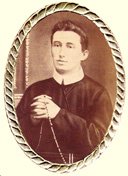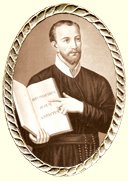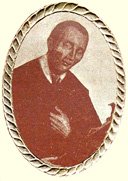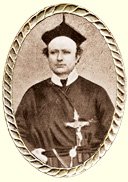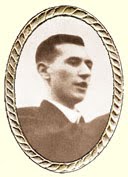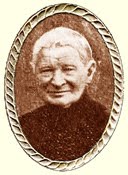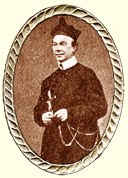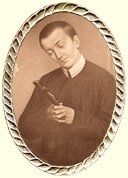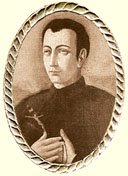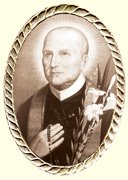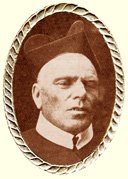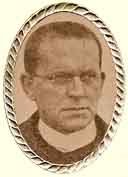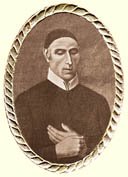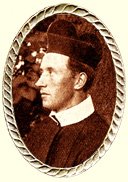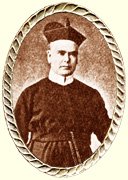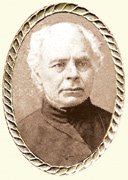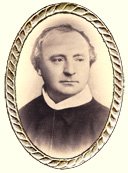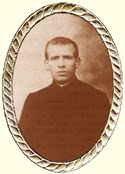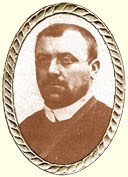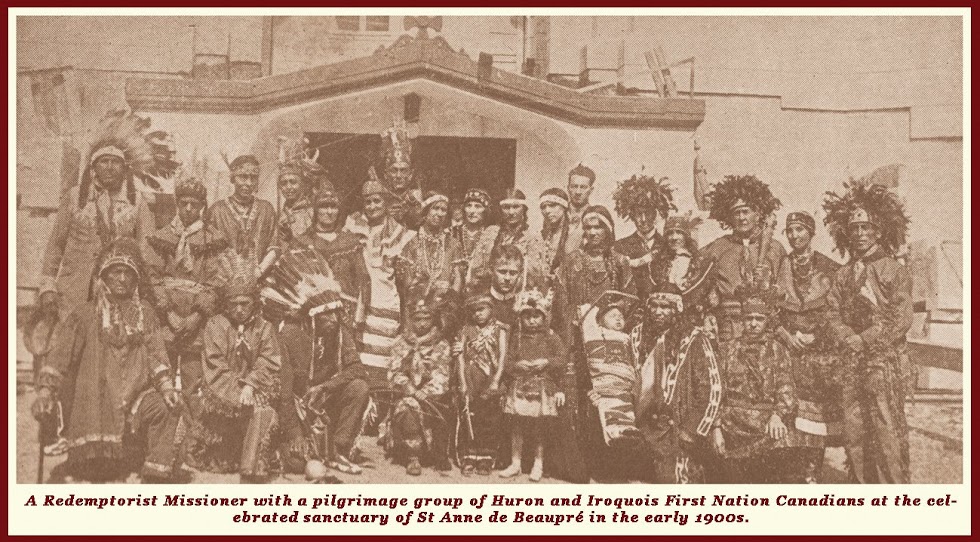Rev Fr George Kaiser, C.SS.R. (1867- 1929)
The Reverend Father George Kaiser was born on 13 February 1867 at Rahling, but spent most of his early years at Pont-a-Mousson where his parents had moved in 1870 during the Franco-Prussian War. Whilst still only a young boy, he entered the Redemptorist Minor Seminary that at that time, October 1879, was situated at Contamines. By the curiosity of his mind, sharp intellect, calm and equable temperament and genuine piety, he displayed to everyone clear indications of a heavenly vocation to the religious life.
On 8 September 1885 he was clad in the habit of St. Alphonsus and entered the novitiate at Stratum in Holland under the guidance of the novice-master, Reverend Father Zephyrinus. On the very same date the next year he set out for the House of Studies at Dongen. There, from the very outset, he took pains to foster piety and to lay the foundations of the spiritual life. He was tireless in becoming thoroughly acquainted with all the disciplines of the Church and was extremely keen to investigate the most profound questions, especially in Sacred Theology. He immersed himself in the works of the great master, the Angelic Doctor, whom he held in great affection for as long as he lived. Moreover, by studious reading he voyaged through the works of the Holy Fathers, imbibing the sublime wisdom of the books, particularly the works of St Augustine whom he took as his patron from that time onwards.
He was ordained to the priesthood on 4 October 1892 and boarded the ship that would carry him and his companions, Fathers Houel and Dupont, to the shores of South America. He reached Riombaba, Ecuador on 13 August, but in November the following year he was transferred to the monastery at Concha to undertake the job of teaching six American students. However, when the students were posted six months later to the House of Studies of St. James in Santiago, Chile, the Reverend Father Kaiser returned to the monastery at Riombaba to undergo there a second novitiate.
During this period of solitude he prepared himself with the greatest diligence for the apostolate – an apostolate to the most lowly, to whom he was driven with a hunger to win them over for Jesus Christ. He composed public sermons with the intention to effect the conversion of those ignorant of Christ through a speaking style that was completely open and clear. So in January 1895, near the end of his second novitiate, by tireless effort he succeeded in amassing a copious series of discourses and instructions to use in his apostolic mission.
But as soon as the missionary began to attempt to communicate with those who came to listen, he found that he had not achieved at all the outcome he had intended in his written discourses. Indeed, he realised that the rationale of his sermons was flawed: he needed to find a method that truly allowed the speaker to communicate with the listener. He had no doubt that the fruit of all his speech-writing labours should be thrown on the fire.
Once again, therefore, he set about composing sermons, but with a fresh approach. He worked studiously and assiduously to achieve a style of preaching after the manner of St. Alphonsus, who appealed to simple people. That apostle had, by dint of enormous effort, become a man whom both the uneducated and the learned would listen to with an open mind, because his method of preaching was clear, easily grasped and aflame with enthusiasm. Moreover, although Father Kaiser treated the Word of God with due reverence, he did not fail to add every day a fresh force and strength to his preaching by preparing to fulfil his task with the greatest diligence.
In explaining doctrine to the people he made considerable use of ideas developed by the Holy Fathers. He strove with all his might, by using examples taken from the lives of the Fathers themselves, to make his points immediate to his listeners, as if he were placing the evidence before their very eyes. What is more, in order that his teaching might be truly useful and bring about the desired results, he showed his listeners with kindly care how they could put these things into practice.
On 21 January 1895 Reverend Father Kaiser set out for Concha with the intention of remaining there to the end of his life. For 35 years, except for a short interval when he was entrusted with running the novitiate training of the coadjutor brothers, he did not cease to travel throughout every part of the huge diocese of Concha. There was not a parish or a small village that lacked the benefit of his apostolate; nor did he ever succumb to an illness that could effect his strength at all or interrupt his apostolic labours.
Right up to the end of his life, the patience and courage he showed while enduring his hard work won the admiration of his brethren; indeed, he provided for them the perfect example of a missionary of the Most Holy Redeemer – a man who took no account of the state of his health nor sought any alleviation from the privations, troubles or various discomforts with which a missionary life abounds.
So, from the early days of his apostolic work, Father Kaiser attained such renown that not only was the fame of his name spread throughout the entire region, but he also won over the hearts of men wherever he travelled. He treated the needy and the wretched, whoever they might be, with such kindliness, fellow-feeling and mercy that they could all approach him with the greatest confidence. Even if it was not in his power to satisfy every request that was made of him, he never sent anyone away without first consoling them in their affliction with fatherly counsel.
The popularity of the hard-working missionary was no less widespread throughout Concha than in the parishes of the province of Azuaya, for there was no-one who did not share his friendship. Not even those whose minds were perverse in their feelings about religion were excluded from his paternal care. For as a zealous Redemptorist he in no way neglected this grace. He would address such men with words so telling that many of them, seriously contemplating eternal matters, especially on the point of death, would summon Father Kaiser as a friend and unburden their consciences with him. And so it came about that Father Kaiser obtained remarkable conversions.
Our beloved Father Kaiser wrote to a colleague in a letter dated 23 September 1929: “Having celebrated the Feast of St. Michael, I am about to undertake my annual spiritual retreat. O blessed solitude, O sole beatitude! Afterwards I must leave for the Missions to be held in those regions bordering on Concha. I shall return home on 20th December. The work does not cease. However, we should take particular pains to attend properly to what has to be done, following the example of the Master who 'did all things well'.” But soon death would attack him whilst he held his weapons in his hands, fighting in the battle-line. He had no suspicion at the time that the Lord would summon him to eternal life so soon.
On Sunday 1 December 1929 at the parish centre at Vallis, he began his spiritual exercises, after having done so for two whole months in the neighbouring parishes and districts nearby. On that same day he sent a message to the Reverend Father Rector saying that he and his missionary companion were in the best of health; but in the evening, when he sat down to eat before attending the spiritual exercises, he felt unwell. As he was attempting to get up, he fell down unconscious. His associate, the parish priest, tried with every care and effort to lift him up and bring him back to consciousness. It was in vain. A quarter of an hour later the good servant crossed over to his true fatherland to receive a fitting reward for a long and fruitful apostolate.
 The entire state of Concha was upset at the news of his death. Many people mourned a loving father, a kindly and prudent counsellor or a most devoted friend whose conspicuous goodness they held in the highest possible esteem. Through the president of the Municipal Council the rulers of the city made known their wish that there be a memorial to make clear both to the resident French officials and to the Redemptorists the benefits which the now deceased father had brought to the entire community.
The entire state of Concha was upset at the news of his death. Many people mourned a loving father, a kindly and prudent counsellor or a most devoted friend whose conspicuous goodness they held in the highest possible esteem. Through the president of the Municipal Council the rulers of the city made known their wish that there be a memorial to make clear both to the resident French officials and to the Redemptorists the benefits which the now deceased father had brought to the entire community.
On the second day of the week his dead body, accompanied by a great throng of the pious inhabitants of Vallis, was transported to Concha where a crowd of citizens too numerous to estimate awaited its arrival. At the point when the bier was to be lowered into the community’s burial ground, Dr. Michael Cordero, an aristocrat of Concha and a Catholic deputy who had defended Church rights so strongly at the Convention of the Republic, gave an eloquent address. An very close friend of Reverend Father Kaiser, Dr. Cordero recalled and celebrated the virtues of the dead man who had been so dear to so many.
A sweet and deeply-felt hope that this beloved brother possesses an eternal reward for his labours fills us. Indeed, we are not prevented from asking with a simple heart that he might help us to follow his example with a firm and steady pace treading in the footsteps of Our Divine Saviour, snatching souls from Hell and putting them in the hands of God. †
On 8 September 1885 he was clad in the habit of St. Alphonsus and entered the novitiate at Stratum in Holland under the guidance of the novice-master, Reverend Father Zephyrinus. On the very same date the next year he set out for the House of Studies at Dongen. There, from the very outset, he took pains to foster piety and to lay the foundations of the spiritual life. He was tireless in becoming thoroughly acquainted with all the disciplines of the Church and was extremely keen to investigate the most profound questions, especially in Sacred Theology. He immersed himself in the works of the great master, the Angelic Doctor, whom he held in great affection for as long as he lived. Moreover, by studious reading he voyaged through the works of the Holy Fathers, imbibing the sublime wisdom of the books, particularly the works of St Augustine whom he took as his patron from that time onwards.
He was ordained to the priesthood on 4 October 1892 and boarded the ship that would carry him and his companions, Fathers Houel and Dupont, to the shores of South America. He reached Riombaba, Ecuador on 13 August, but in November the following year he was transferred to the monastery at Concha to undertake the job of teaching six American students. However, when the students were posted six months later to the House of Studies of St. James in Santiago, Chile, the Reverend Father Kaiser returned to the monastery at Riombaba to undergo there a second novitiate.
During this period of solitude he prepared himself with the greatest diligence for the apostolate – an apostolate to the most lowly, to whom he was driven with a hunger to win them over for Jesus Christ. He composed public sermons with the intention to effect the conversion of those ignorant of Christ through a speaking style that was completely open and clear. So in January 1895, near the end of his second novitiate, by tireless effort he succeeded in amassing a copious series of discourses and instructions to use in his apostolic mission.
But as soon as the missionary began to attempt to communicate with those who came to listen, he found that he had not achieved at all the outcome he had intended in his written discourses. Indeed, he realised that the rationale of his sermons was flawed: he needed to find a method that truly allowed the speaker to communicate with the listener. He had no doubt that the fruit of all his speech-writing labours should be thrown on the fire.
Once again, therefore, he set about composing sermons, but with a fresh approach. He worked studiously and assiduously to achieve a style of preaching after the manner of St. Alphonsus, who appealed to simple people. That apostle had, by dint of enormous effort, become a man whom both the uneducated and the learned would listen to with an open mind, because his method of preaching was clear, easily grasped and aflame with enthusiasm. Moreover, although Father Kaiser treated the Word of God with due reverence, he did not fail to add every day a fresh force and strength to his preaching by preparing to fulfil his task with the greatest diligence.
In explaining doctrine to the people he made considerable use of ideas developed by the Holy Fathers. He strove with all his might, by using examples taken from the lives of the Fathers themselves, to make his points immediate to his listeners, as if he were placing the evidence before their very eyes. What is more, in order that his teaching might be truly useful and bring about the desired results, he showed his listeners with kindly care how they could put these things into practice.
On 21 January 1895 Reverend Father Kaiser set out for Concha with the intention of remaining there to the end of his life. For 35 years, except for a short interval when he was entrusted with running the novitiate training of the coadjutor brothers, he did not cease to travel throughout every part of the huge diocese of Concha. There was not a parish or a small village that lacked the benefit of his apostolate; nor did he ever succumb to an illness that could effect his strength at all or interrupt his apostolic labours.
Right up to the end of his life, the patience and courage he showed while enduring his hard work won the admiration of his brethren; indeed, he provided for them the perfect example of a missionary of the Most Holy Redeemer – a man who took no account of the state of his health nor sought any alleviation from the privations, troubles or various discomforts with which a missionary life abounds.
So, from the early days of his apostolic work, Father Kaiser attained such renown that not only was the fame of his name spread throughout the entire region, but he also won over the hearts of men wherever he travelled. He treated the needy and the wretched, whoever they might be, with such kindliness, fellow-feeling and mercy that they could all approach him with the greatest confidence. Even if it was not in his power to satisfy every request that was made of him, he never sent anyone away without first consoling them in their affliction with fatherly counsel.
The popularity of the hard-working missionary was no less widespread throughout Concha than in the parishes of the province of Azuaya, for there was no-one who did not share his friendship. Not even those whose minds were perverse in their feelings about religion were excluded from his paternal care. For as a zealous Redemptorist he in no way neglected this grace. He would address such men with words so telling that many of them, seriously contemplating eternal matters, especially on the point of death, would summon Father Kaiser as a friend and unburden their consciences with him. And so it came about that Father Kaiser obtained remarkable conversions.
Our beloved Father Kaiser wrote to a colleague in a letter dated 23 September 1929: “Having celebrated the Feast of St. Michael, I am about to undertake my annual spiritual retreat. O blessed solitude, O sole beatitude! Afterwards I must leave for the Missions to be held in those regions bordering on Concha. I shall return home on 20th December. The work does not cease. However, we should take particular pains to attend properly to what has to be done, following the example of the Master who 'did all things well'.” But soon death would attack him whilst he held his weapons in his hands, fighting in the battle-line. He had no suspicion at the time that the Lord would summon him to eternal life so soon.
On Sunday 1 December 1929 at the parish centre at Vallis, he began his spiritual exercises, after having done so for two whole months in the neighbouring parishes and districts nearby. On that same day he sent a message to the Reverend Father Rector saying that he and his missionary companion were in the best of health; but in the evening, when he sat down to eat before attending the spiritual exercises, he felt unwell. As he was attempting to get up, he fell down unconscious. His associate, the parish priest, tried with every care and effort to lift him up and bring him back to consciousness. It was in vain. A quarter of an hour later the good servant crossed over to his true fatherland to receive a fitting reward for a long and fruitful apostolate.
 The entire state of Concha was upset at the news of his death. Many people mourned a loving father, a kindly and prudent counsellor or a most devoted friend whose conspicuous goodness they held in the highest possible esteem. Through the president of the Municipal Council the rulers of the city made known their wish that there be a memorial to make clear both to the resident French officials and to the Redemptorists the benefits which the now deceased father had brought to the entire community.
The entire state of Concha was upset at the news of his death. Many people mourned a loving father, a kindly and prudent counsellor or a most devoted friend whose conspicuous goodness they held in the highest possible esteem. Through the president of the Municipal Council the rulers of the city made known their wish that there be a memorial to make clear both to the resident French officials and to the Redemptorists the benefits which the now deceased father had brought to the entire community.On the second day of the week his dead body, accompanied by a great throng of the pious inhabitants of Vallis, was transported to Concha where a crowd of citizens too numerous to estimate awaited its arrival. At the point when the bier was to be lowered into the community’s burial ground, Dr. Michael Cordero, an aristocrat of Concha and a Catholic deputy who had defended Church rights so strongly at the Convention of the Republic, gave an eloquent address. An very close friend of Reverend Father Kaiser, Dr. Cordero recalled and celebrated the virtues of the dead man who had been so dear to so many.
A sweet and deeply-felt hope that this beloved brother possesses an eternal reward for his labours fills us. Indeed, we are not prevented from asking with a simple heart that he might help us to follow his example with a firm and steady pace treading in the footsteps of Our Divine Saviour, snatching souls from Hell and putting them in the hands of God. †





















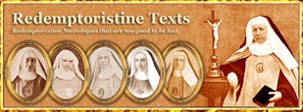
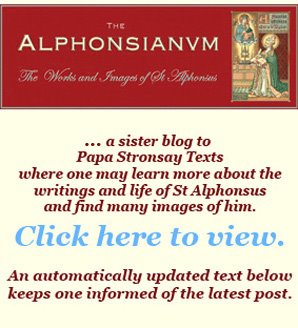.jpg)









